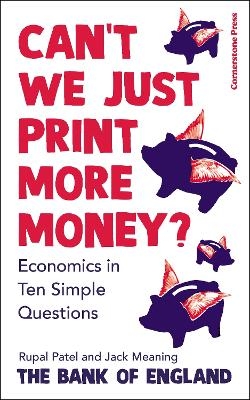
Can’t We Just Print More Money?
Economics in Ten Simple Questions
Seiten
2022
Cornerstone Press (Verlag)
978-1-84794-338-5 (ISBN)
Cornerstone Press (Verlag)
978-1-84794-338-5 (ISBN)
- Titel ist leider vergriffen;
keine Neuauflage - Artikel merken
'A well-written treat' Professor David Spiegelhalter, author of The Art of Statistics
'An enjoyable introduction' The Times
'Entertaining and essential' Laura Whateley, author of Money: A User's Guide
__
Why are all my clothes made in Asia? How come I'm so much richer than my great-great-grandma? And what even is money?
Whether you're buying lunch, looking for a job, or applying for a mortgage, the thing we call 'the economy' is going to set the terms. A pity, then, that many of us have no idea how the economy actually works.
That's where this book comes in. The Bank of England is Britain's most important financial institution, responsible for printing money, regulating banks and keeping the economy running smoothly. Now, the Bank's team take you inside their hallowed halls to explain what economics can - and can't - teach us about the world. Along the way, they offer intriguing examples of econ in action: in financial crises and Freddo prices, growth stages and workers' wages. Accessible, authoritative and surprisingly witty, this is a crash course in economics and why it matters.
__
'If you feel you should understand how economists think but have no idea where to start, this book is the answer . . . Buy this book for the inquiring person, young, old or in between.' Martin Wolf, Financial Times
The Sunday Times Business Bestseller
'An enjoyable introduction' The Times
'Entertaining and essential' Laura Whateley, author of Money: A User's Guide
__
Why are all my clothes made in Asia? How come I'm so much richer than my great-great-grandma? And what even is money?
Whether you're buying lunch, looking for a job, or applying for a mortgage, the thing we call 'the economy' is going to set the terms. A pity, then, that many of us have no idea how the economy actually works.
That's where this book comes in. The Bank of England is Britain's most important financial institution, responsible for printing money, regulating banks and keeping the economy running smoothly. Now, the Bank's team take you inside their hallowed halls to explain what economics can - and can't - teach us about the world. Along the way, they offer intriguing examples of econ in action: in financial crises and Freddo prices, growth stages and workers' wages. Accessible, authoritative and surprisingly witty, this is a crash course in economics and why it matters.
__
'If you feel you should understand how economists think but have no idea where to start, this book is the answer . . . Buy this book for the inquiring person, young, old or in between.' Martin Wolf, Financial Times
The Sunday Times Business Bestseller
Rupal Patel and Jack Meaning are economists at the Bank of England, the UK's central bank. Founded in 1694, the Bank of England was created to 'promote the public good and benefit of the people'. How it does so has changed a bit since then, but the Bank still plays a crucial role in the economy - printing money, setting interest rates and regulating the financial sector. Since 2017, the Bank's staff have been on a mission to get outside the City of London and promote economic literacy across the UK: whether by delivering talks in schools, running Citizens' Panels on people's economic experiences, or, now, publishing this nifty primer on economics.
| Erscheinungsdatum | 20.05.2022 |
|---|---|
| Sprache | englisch |
| Maße | 135 x 216 mm |
| Gewicht | 318 g |
| Themenwelt | Geschichte ► Teilgebiete der Geschichte ► Wirtschaftsgeschichte |
| Wirtschaft ► Betriebswirtschaft / Management ► Finanzierung | |
| Betriebswirtschaft / Management ► Spezielle Betriebswirtschaftslehre ► Bankbetriebslehre | |
| Wirtschaft ► Volkswirtschaftslehre | |
| ISBN-10 | 1-84794-338-1 / 1847943381 |
| ISBN-13 | 978-1-84794-338-5 / 9781847943385 |
| Zustand | Neuware |
| Haben Sie eine Frage zum Produkt? |
Mehr entdecken
aus dem Bereich
aus dem Bereich


